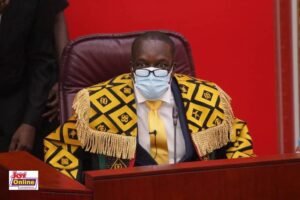
Shirley Ayorkor Botchway, Minister of Foreign Affairs and Regional Integration
The Ministry of Foreign Affairs and Regional Integration says it has successfully evacuated 856 Ghanaians, who had been stranded in various countries due to the coronavirus-induced border closures and challenges, back home.
The second batch of 250 Ghanaians stranded in the United Arab Emirates arrived in the country yesterday.
Addressing the media yesterday, the sector Minister, Shirley Ayorkor Botchwey, further revealed that under an assisted evacuation process, over 400 more stranded Ghanaians are expected to return home today, June 17, and Sunday, June 21, 2020.
On Friday, June 19, 13 Ghanaians are expected to arrive from Burkina Faso while 195 are expected from Lebanon, Ms Ayorkor Botchwey added.
She said stranded Ghanaians in New York and Washington DC, in the US, are expected at the end of the month, adding that discussion has begun to evacuate nationals in other African countries.
The arrivals will be quarantined, subject to the coronavirus prevention protocols.
Responding to whether the Ghanaian nationals were being evacuated from their respective places of residence, the Minister said that the evacuation process was being conducted at central points, which have direct flights to Accra to make the process easy.
“It will be difficult for us to be going from state to state and organise people to bring them back,” Ms Ayorkor Botchwey said.
Categories
According to her, the evacuation of stranded Ghanaians abroad has been categorised into four groups. These include Ability-to-Pay, which comprises private individuals, business/corporate–sponsored employees, privately-sponsored students on exchange programmes, Government–sponsored students who are yet to complete their courses but who without any compelling reasons insist on returning home.
She said the category also covers foreign–sponsored evacuations which only require the government to provide travel documents and guarantee safe passage, as well as Ghana residence permit holders, including diplomats and their dependents.
The second category is the government-funded evacuation, which comprises government officials who travelled on official business, government-sponsored students who have completed their courses of study, as well as government-sponsored students who are yet to complete their courses but who are compelled to leave their places of residence.
The third category is the distressed and destitute, comprising Ghanaians who had travelled to various countries before the advent of the pandemic but whose circumstances have been worsened due to the crisis and consequent travel bans and other restrictions imposed by different countries around the world.
The fourth group is made up of deportees, ie. Ghanaians who have been scheduled for removal from various countries.
Challenges
Ms Ayorkor Botchwey noted that a difficulty faced by the government is finding smaller hotels that are willing to open their facilities to be used as isolation centres, saying this has contributed to the high cost of hotel bills for evacuees.
“It is difficult to get hotels that can be used for quarantine. It is a major problem. It is the ones that have agreed to be used that are currently being used,” she said.
“The second issue that we have is that even if a small hotel agrees to be part of this, the problem would be that you will have a hotel or guest with ten rooms, seven rooms, five rooms, and the logistics to make sure that the health professionals are able to visit them.
“Also, the security services would have to be posted at these quarantine centres and that would also be a problem. So, we are always looking for larger hotels that will be able to cater for large numbers to make it easier for us,” the Minister added.
She however indicated that the government remains committed to making sure every stranded Ghanaian is brought home safely, adding that there are plans to ensure the cost on evacuees are reduced.








